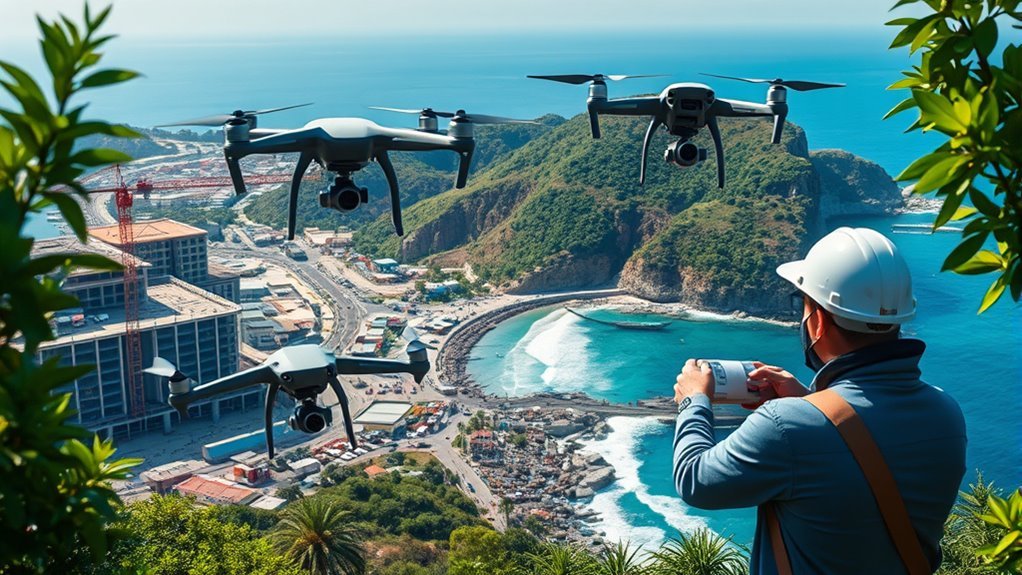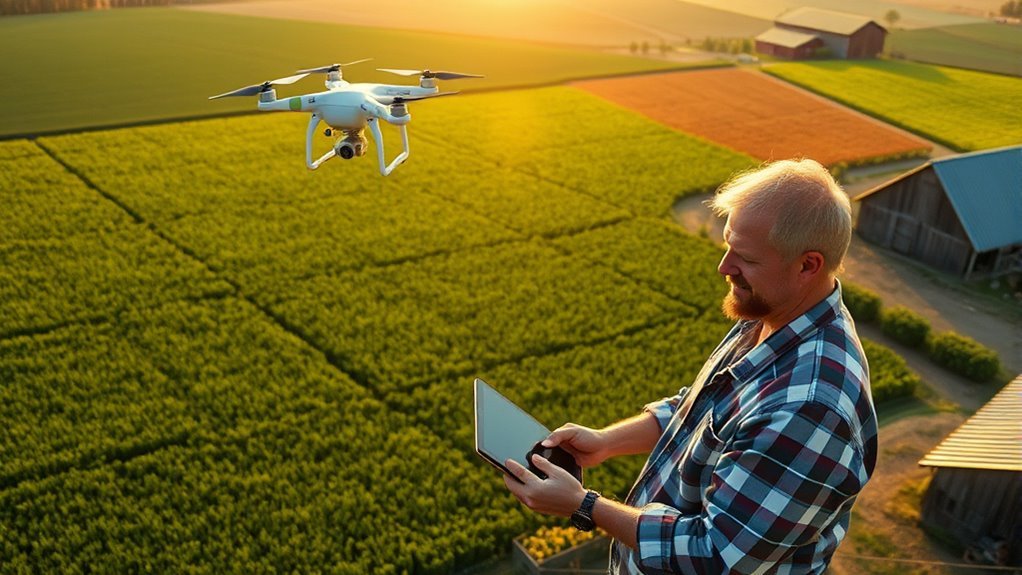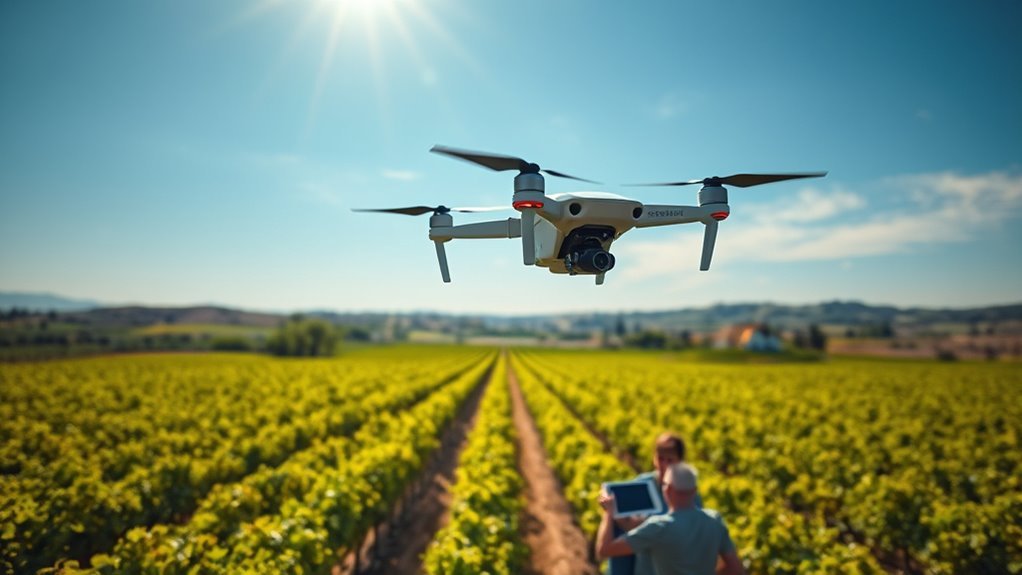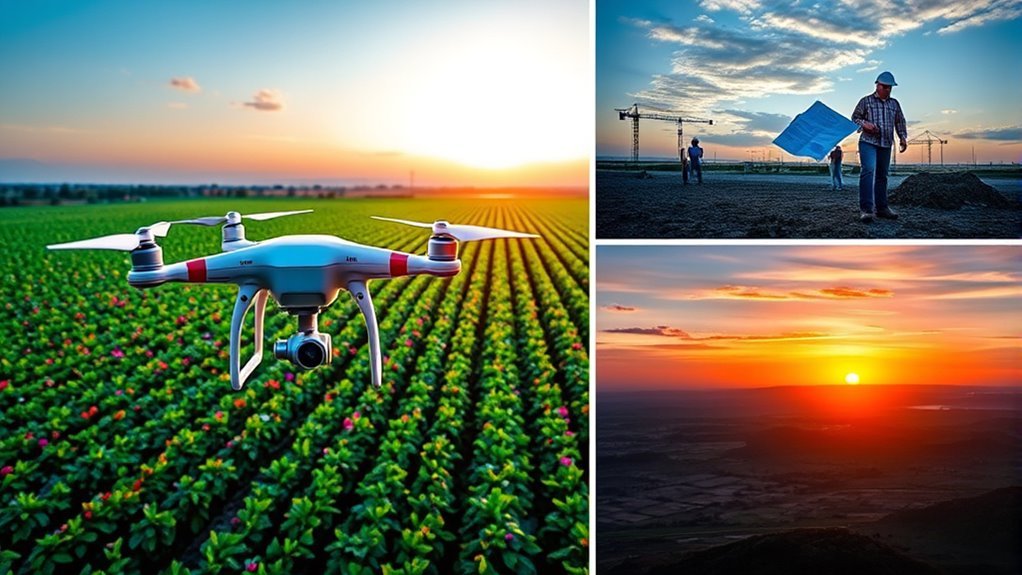You can profit from drones in several ways. First, offering aerial photography and videography services provides unique coverage for events and businesses, enhancing marketing efforts. Next, drone-based agricultural monitoring enables you to assist farmers with real-time crop health data, optimizing their practices. Finally, real estate marketing through drone tours increases property appeal and visibility. Each avenue offers diverse income opportunities that can set you apart in the competitive market. Explore these options further to discover their potential benefits.
Aerial Photography and Videography Services

Aerial photography and videography services offer a lucrative opportunity for drone operators, with the market expected to grow substantially in the coming years. By utilizing drones, you can provide high-quality event coverage that captures unique angles and perspectives, enhancing the visual storytelling of any occasion. This service is increasingly sought after for weddings, corporate events, and public gatherings. Additionally, you can create compelling promotional content tailored for businesses looking to elevate their marketing strategies. The ability to showcase products, real estate, or services from the air not only distinguishes your offerings but also meets the growing demand for creative visuals. Mastering these aerial techniques can position you competitively in a rapidly evolving industry, granting you the freedom to explore various revenue streams. With the L800 Pro 2’s advanced camera system, you can ensure that your aerial footage retains exceptional clarity and detail, making your services even more appealing to potential clients. The Dji Mini 2’s impressive clarity allows you to capture stunning visuals that will amaze your clients and enhance your portfolio.
Drone-Based Agricultural Monitoring

As the demand for sustainable farming practices rises, utilizing drones for agricultural monitoring has emerged as a game changer for farmers. Drones equipped with advanced sensors can provide real-time data on crop health, enabling you to make informed decisions that enhance yields. By employing precision farming techniques, you can monitor soil conditions, assess irrigation needs, and detect pest infestations early on. This not only optimizes resource usage but also reduces costs and environmental impact. The data collected allows for timely interventions, ensuring your crops thrive throughout the growing season. Additionally, integrating drone technology into your agricultural practices positions you ahead of the curve, embracing innovation while promoting sustainability. Furthermore, this technology aligns with precision agriculture, which maximizes output while minimizing resource use in farming operations. Drones also utilize real-time soil assessment to analyze moisture, pH, and nutrient levels, further enhancing your farming efficiency and profitability.
Real Estate Marketing and Inspections

While many traditional marketing methods have their merits, integrating drones into real estate marketing and inspections offers a unique advantage that can markedly enhance property visibility and appeal. With drone tours, you can provide potential buyers an immersive experience that showcases properties from angles and heights that static images simply can’t achieve. This not only captivates viewers but also delivers a thorough understanding of the property’s layout and surroundings. Additionally, drones streamline property surveys, allowing for quick and precise assessments of large areas, reducing the time and cost associated with traditional methods. By leveraging drone technology, you’re not just enhancing listings; you’re also positioning yourself as a forward-thinking agent, ready to meet the demands of a competitive market. Notably, drones like the DJI Air 3 offer advanced features such as obstacle avoidance and high-resolution cameras that can significantly improve marketing efforts. Drones with 4K resolution capabilities can capture intricate details that further entice potential buyers.
Frequently Asked Questions
What Are the Legal Requirements for Flying Drones Commercially?
To fly drones commercially, you’ll need to comply with drone regulations, including obtaining a remote pilot certificate. Be aware of flight restrictions in specific areas to guarantee safety and avoid legal complications while pursuing your freedom.
How Do I Obtain a Drone Pilot Certification?
Did you know that over 90% of drone pilots find their certification opens up new career opportunities? To obtain yours, enroll in drone training programs and follow the certification process to guarantee compliance and safety.
What Is the Average Startup Cost for a Drone Business?
The average startup cost for a drone business varies by drone types, typically ranging from $5,000 to $15,000. You’ll need to take into account equipment, software, and potential startup funding to guarantee a solid foundation.
How Can I Market My Drone Services Effectively?
Did you know 80% of consumers trust recommendations from friends? To market your services effectively, leverage social media for engaging content and attend networking events to build connections, showcasing your unique offerings in the drone industry.
What Insurance Do I Need for My Drone Operations?
For your drone operations, you’ll need drone liability insurance to protect against potential damages or injuries. Make certain your insurance coverage meets local regulations and adequately shields you from risks associated with aerial activities.

